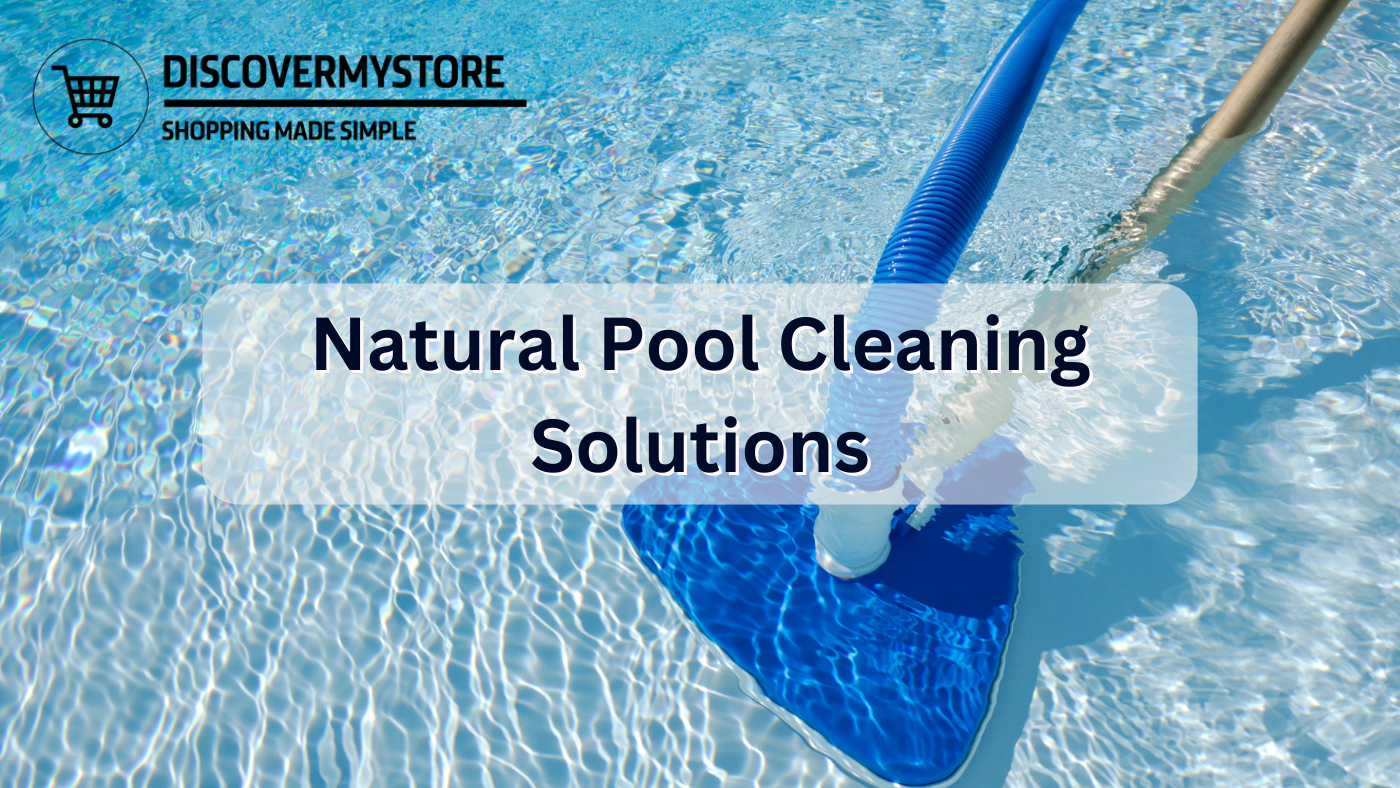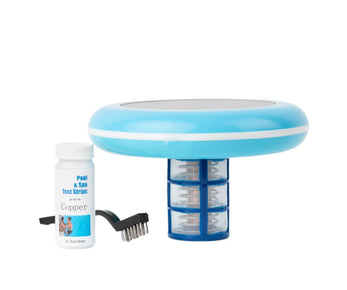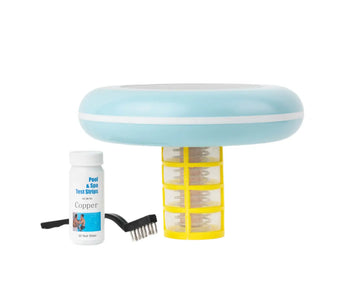
Maintaining a clean and safe swimming pool is essential for any pool owner. While traditional chemical-based cleaners are common, many people are turning to natural pool cleaning solutions for a healthier and more eco-friendly alternative. In this article, we'll explore the benefits of natural pool cleaning and provide guidance on how to implement these solutions for your pool.
Table of Contents
- Traditional vs. Natural Pool Cleaning
- Benefits of Natural Pool Cleaning Solutions
- Popular Natural Pool Cleaning Solutions
- How to Implement Natural Pool Cleaning
- Conclusion
1. Traditional vs. Natural Pool Cleaning
Conventional pool cleaning methods have been the standard for decades. These systems rely heavily on chlorine and other harsh chemicals to sanitize the pool water. Chlorine is effective at killing bacteria, viruses, and algae, which makes it seem like an ideal solution. However, traditional chemical-based cleaning has some significant drawbacks:
- Health Concerns: Chlorine can irritate your skin and eyes, causing redness and itchiness. It can also dry out your hair and cause respiratory problems in some individuals.
- Environmental Impact: Chlorine and other pool chemicals can contaminate the environment. When these chemicals drain into nearby waterways, they can harm aquatic life.
- Unpleasant Experience: Chlorine gives off a strong, unpleasant odor. It can also make the pool water feel harsh and drying on your skin.
On the other hand, natural pool cleaning solutions offer a healthier and more eco-friendly alternative. These systems use non-toxic and biodegradable substances to keep your pool water clean and clear. Natural sanitizers like saltwater, minerals, ozone, and enzymes are gentler on your body and the environment. They can create a more pleasant swimming experience with softer, fresher-smelling water. While natural pool systems may require a larger upfront investment, they can be more cost-effective in the long run by reducing the need for frequent chemical additions.
2. Benefits of Natural Pool Cleaning Solutions
Switching to natural pool cleaning solutions can have several advantages for your health, wallet, and the environment:
- Healthier Swimming: Natural cleaners are gentler on your skin, hair, and eyes compared to traditional chemicals. They reduce the risk of irritation, itchiness, and respiratory problems. This makes natural pools an excellent choice for people with sensitive skin or allergies.
- Eco-Friendly: Natural pool cleaning solutions are biodegradable and won't harm the environment. They minimize the amount of toxic chemicals that contaminate our waterways and soil. By choosing natural cleaners, you can enjoy a clear conscience along with your clear pool water.
- Cost-Effective: While natural pool systems may require a larger upfront investment, they can save you money in the long run. Natural sanitizers like saltwater and ozone generators can last for many years, reducing the need for frequent chemical replacements. They also prolong the life of your pool and its equipment by minimizing corrosion.
- Pleasant Swimming Experience: Natural pool water often feels softer and smells fresher compared to traditionally sanitized pools. The water has a more natural pH level that's closer to human tears, which reduces eye irritation. This creates a more comfortable and enjoyable swimming experience for you and your family.
- Low Maintenance: Natural pool systems can be less hassle to maintain. They require fewer chemical additions and less frequent testing. This frees up more of your time to enjoy the pool instead of constantly monitoring its chemistry.
3. Popular Natural Pool Cleaning Solutions
Several natural substances can effectively clean your pool, each with their own advantages and considerations:
- Saltwater: A saltwater pool uses a saltwater chlorine generator (SWCG) to sanitize the water naturally. Instead of adding chlorine tablets, the SWCG converts salt into chlorine. Saltwater pools are gentler on your skin and eyes, and the water feels softer. The salt level is much lower than seawater, so it won't leave you tasting salty. However, SWCGs require a larger upfront investment, and salt can be corrosive to some pool equipment.
- Mineral Sanitizers: These systems use minerals like silver and copper to kill bacteria and algae. Mineral sanitizers release these minerals into the pool water, providing continuous sanitation. They can be used alongside other natural sanitizers for enhanced cleaning power. Mineral sanitizers are often used in conjunction with saltwater systems. They require periodic replacement of the mineral cells.
- Ozone Generators: Ozone is a powerful natural sanitizer that destroys contaminants on contact. Ozone generators produce ozone gas, which is then dissolved into the pool water. Ozone is toxic to bacteria, viruses, and algae, making it an effective cleaner. However, ozone is short-lived and must be generated continuously. It also requires a residual sanitizer like chlorine or bromine to meet health department regulations.
- Enzyme-Based Cleaners: Enzymes are proteins that break down organic matter. Enzyme-based cleaners contain specialized enzymes that target the oils and contaminants that contribute to algae growth. By digesting these substances, enzymes prevent algae from forming in the first place. Enzymes are non-toxic and biodegradable, making them a popular choice for natural pools. They work best in conjunction with other sanitizers and require regular additions to the pool water.
- UV Sanitizers: Ultraviolet (UV) light is a natural sanitizer that kills microorganisms. UV sanitizers use a special light to destroy bacteria, viruses, and algae. They are often used in commercial pools but can also be used in residential pools. UV sanitizers require less chlorine, which reduces eye and skin irritation. However, UV light only sanitizes the water as it flows through the unit, so a residual sanitizer is still needed.
- Ionizers: Ionizers release ions like copper and silver into the pool water to sanitize it. These ions attach to bacteria and algae, killing them. Ionizers can be used alongside other sanitizers for enhanced cleaning power. They reduce the need for chlorine but don't eliminate it entirely. Ionizers require periodic replacement of the electrode.
- Bromine: Bromine is a natural sanitizer that's similar to chlorine but gentler on the skin and eyes. It's often used in spas but can also be used in swimming pools. Bromine is more stable than chlorine in hot water and sunlight, making it a good choice for outdoor pools. However, bromine tables can still cause respiratory issues in some individuals.
- PHMB: PHMB (polyhexamethylene biguanide) is a non-chlorine sanitizer that's gentler on the skin and eyes. It's often used in pools for people with sensitive skin. PHMB works differently than chlorine, so it's effective against microorganisms that have developed chlorine resistance. However, PHMB doesn't oxidize contaminants as effectively as chlorine, so additional oxidizers may be needed.
4. How to Implement Natural Pool Cleaning
Transitioning to natural pool cleaning requires some planning and consideration. Here's a step-by-step guide to help you get started:
-
Choose a Natural Sanitizer: Research the various natural sanitizers available, such as saltwater, minerals, ozone, enzymes, UV, bromine, and PHMB. Consider your budget, pool size, usage, and personal preferences. You may want to consult with a pool professional to determine the best natural sanitizer for your specific situation. Some natural sanitizers can be used in combination for enhanced cleaning power.
-
Upgrade Your Equipment: Depending on the natural sanitizer you choose, you may need to upgrade your pool equipment. For example, saltwater pools require a saltwater chlorine generator, while ozone generators need an ozone injection system. Make sure your pool plumbing and equipment are compatible with the new sanitizer. It may be helpful to hire a professional for the installation.
-
Test and Balance the Water: Regular water testing is crucial for any pool, including natural pools. You'll need to test the pH, alkalinity, calcium hardness, and stabilizer levels, and adjust as needed. Natural sanitizers work best within a certain pH and alkalinity range. Be sure to use test strips or kits that are designed for natural pools, as they may check for different parameters.
-
Maintain the Pool: Natural pools still require regular maintenance to keep the water clean and clear. Skim the surface daily to remove floating debris. Vacuum the pool floor weekly to remove dirt and sediment. Brush the pool walls and floor regularly to prevent algae growth. Clean the pool filters according to the manufacturer's instructions.
-
Shock the Pool: Even with natural sanitizers, it's necessary to occasionally shock the pool to remove built-up contaminants. There are non-chlorine shockers available that use oxygen or non-chlorine chemicals. Always follow the product instructions when shocking the pool. It's best to shock the pool in the evening, and let it sit overnight before testing and adjusting the chemistry.
-
Monitor the Sanitizer: Depending on the natural sanitizer you're using, you may need to monitor and adjust its output. For example, saltwater chlorine generators have settings that need to be adjusted based on the pool temperature and usage. Ozone generators may have an ORP (oxidation-reduction potential) probe that monitors the sanitizer level. Be sure to follow the manufacturer's instructions for operating and maintaining the sanitizer.
-
Consider Professional Help: While natural pools can be less maintenance than traditional pools, they still require regular upkeep. If you don't have the time or knowledge to maintain your pool properly, consider hiring a professional pool service that's experienced with natural pools. They can provide routine maintenance, perform repairs, and ensure your pool water is always safe and clean.
By following these steps and staying committed, you can successfully transition to natural pool cleaning and enjoy a healthier, more eco-friendly swimming experience.
5. Conclusion
Natural pool cleaning solutions offer a healthier and more eco-friendly way to maintain your pool. By understanding the benefits and popular options, you can make an informed decision to switch to natural pool cleaning. With proper implementation and maintenance, you can enjoy a clean, safe, and pleasant swimming experience all season long.
Remember, transitioning to a natural pool takes time and patience. Don't be discouraged if you encounter some initial challenges – it's a learning process. Be prepared to invest time in researching the best natural sanitizer for your pool, upgrading your equipment, and learning how to properly test and balance the water.
The key to a successful natural pool is consistency. Regular testing, maintenance, and sanitizing are crucial for keeping the water clean and clear. Stay committed to your routine, and make adjustments as needed based on the test results.
If you're new to natural pools, it may be helpful to consult with a pool professional who's experienced with these systems. They can provide valuable guidance and help you avoid common mistakes. With their expertise and your dedication, you can create a thriving natural pool that's a joy to swim in.
By choosing natural pool cleaning solutions, you're not only improving your swimming experience but also contributing to a healthier environment. You're reducing your reliance on harsh chemicals, minimizing pollution, and promoting sustainability. So take the plunge and join the natural pool movement. Your body, pool, and planet will thank you.
Happy and healthy swimming!


